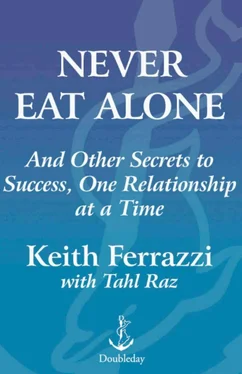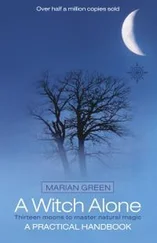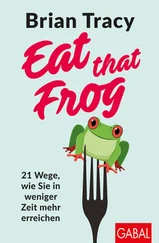Keith Ferrazzi - Never Eat Alone
Здесь есть возможность читать онлайн «Keith Ferrazzi - Never Eat Alone» весь текст электронной книги совершенно бесплатно (целиком полную версию без сокращений). В некоторых случаях можно слушать аудио, скачать через торрент в формате fb2 и присутствует краткое содержание. Год выпуска: 2005, ISBN: 2005, Издательство: C U R R E N C Y • D O U B L E D A Y, Жанр: marketing, на английском языке. Описание произведения, (предисловие) а так же отзывы посетителей доступны на портале библиотеки ЛибКат.
- Название:Never Eat Alone
- Автор:
- Издательство:C U R R E N C Y • D O U B L E D A Y
- Жанр:
- Год:2005
- ISBN:0-385-51529-4
- Рейтинг книги:4 / 5. Голосов: 1
-
Избранное:Добавить в избранное
- Отзывы:
-
Ваша оценка:
- 80
- 1
- 2
- 3
- 4
- 5
Never Eat Alone: краткое содержание, описание и аннотация
Предлагаем к чтению аннотацию, описание, краткое содержание или предисловие (зависит от того, что написал сам автор книги «Never Eat Alone»). Если вы не нашли необходимую информацию о книге — напишите в комментариях, мы постараемся отыскать её.
Never Eat Alone — читать онлайн бесплатно полную книгу (весь текст) целиком
Ниже представлен текст книги, разбитый по страницам. Система сохранения места последней прочитанной страницы, позволяет с удобством читать онлайн бесплатно книгу «Never Eat Alone», без необходимости каждый раз заново искать на чём Вы остановились. Поставьте закладку, и сможете в любой момент перейти на страницу, на которой закончили чтение.
Интервал:
Закладка:
Mrs. Roosevelt arranged for Anderson to perform on the steps of the Lincoln Memorial. The show, on April 9 (Easter Sunday), 1 9 3 9 , was seen by a crowd of 7 5 , 0 0 0 .
Yes, loyalty matters. But not when it means sacrificing your principles.
Though Eleanor Roosevelt's positions on civil rights hardly seem radical today, they were far in advance of her time: All of this was decades before the Supreme Court, in its 1954 Brown v. Board of Education case, rejected the "separate but equal" doctrine.
Every time the First Lady advocated for a social cause, preached tolerance in a black church or Jewish temple, or even when, acting as a delegate to the newly formed United Nations, which passed the controversial Universal Declaration of Human Rights, she lost friends and received vicious criticism for going against the tide.
Still, this amazing woman persisted in successfully building influence for a progressive agenda. She left a legacy to which we are all indebted. What can we learn from Eleanor Roosevelt? It's not enough simply to reach out to others; instead, we all must be vigilant that our efforts to bring people together are in line with our efforts to, in part, make the world a better place.
Of course, when you're driven by principles, there are always sacrifices involved. But your determination to connect with others should never come at the expense of your values. In fact, your network of colleagues and friends, if chosen wisely, can help you fight for causes you believe in.
30. Balance Is B.S.
Balance is a myth.
You can't call my schedule "balanced" by conventional standards. Let's take a look at a typical day. Monday: I was up at 4 A.M. in Los Angeles to make calls to my team in New York. Then I worked the phone for a few more hours, trying to organize a fundraiser for a candidate friend of mine. By 7 A.M., I was at the airport for a flight to Portland, Oregon, to meet a new customer (with two cell phones buzzing, fidgeting with my BlackBerry, sending short e-mails, and my laptop never far away with spreadsheet access). After the meeting, I'm back in the car on my way to Seattle and back on the phone, setting up meetings for tonight, tomorrow, and a week from now. I'm in constant contact with my assistant, trying to get invitations out for a big dinner party I'm throwing in a month. In Seattle, I have a scheduled dinner with the folks organizing Bill Gates's CEO conference this year, after which I'll have drinks with some close friends. And tomorrow, there will be another 4 A.M. wake-up call to do it all again.
Welcome to what my friends jokingly refer to as "Ferrazzi Time," a zone of operations in which the switchboards are always open and the rush of humanity is ongoing.
Witnessing such a schedule begs a number of very important questions: Is this a life? Operating in such a way, can one have balance between work and having a life? And do you—God forbid— have to operate in Ferrazzi Time to be successful?
The answers are: Yes, it is a life, albeit my own; yes, you can find balance, albeit your own; and no, thank heavens, you don't have to do it my way.
For me, the best thing about a relationship-driven career is that it isn't a career at all. It's a way of living. Several years ago, I started to realize that connecting was actually a way of seeing the world. When I thought and behaved in that way, dividing my life between professional and personal spheres no longer made sense. I realized that what made you successful in both worlds were other people and the way you related to them. Whether those people were family people, work people, or friend people, real connecting insists that you bring the same values to every relationship. As a result, I no longer needed to make a distinction between my career happiness and my life happiness—they were both pieces of me. My life.
When it became clear to me that the key to my life was the relationships in it, I found there was no longer a need to compartmentalize work from, say, family or friends. I could spend my birthday at a business conference and be surrounded with warm and wonderful friends, as I recently did, or I could be at home in Los Angeles or New York with equally close friends to celebrate.
The kind of false idea of balance as some sort of an equation, that you could take this many hours from one side of your life and give it to this other side, flew out the window. And with it went all the stress of trying to achieve that perfect state of equilibrium we read and hear so much about.
Balance can't be bought or sold. It doesn't need to be "implemented." Balance is a mind-set, as individual and unique as our genetic code. Where you find joy, you find balance. My wacky schedule works for me and perhaps only for me. The blurring of professional and personal lives isn't for everyone. The important thing is to see connecting with others not just as another manipulative tool used toward achieving a goal but rather as a way of life. When you're out of balance, you'll know because you'll be rushed, angry, and unfulfilled. When you're balanced, you'll be joyful, enthusiastic, and full of gratitude.
Don't worry about trying to develop your own version of Ferrazzi Time. The way you reach out to others is the way you eat an 800-pound elephant: one small bite at a time.
In the end, we all live one life. And that life is all about the people we live it with.
More People, More Balance
If you buy into the myth of balance (the one that sees life as an equation), as I once did, the answers to such questions as "If I'm so 'accomplished,' why aren't I having more fun?" or "If I'm so 'organized,' why do I feel so out of control?" is to "simplify," "compartmentalize," or "reduce" your life into its most essential components.
So we try to save time by eating our lunches at our desk. We have less serendipitous conversations with colleagues, strangers, and other "nonessentials" at the water cooler. We consolidate our schedules to include only the most important actions.
People tell us, "If you just get more organized, if you strike a balance between work and home, and limit yourself to the important people in your life, you'll feel better." That's just totally misguided. What they should be saying is "I gotta get a life filled with people I love." The problem, as I see it, isn't what you're working on, it's whom you're working with.
You can't feel in love with your life if you hate your work; and, more times than not, people don't love their work because they work with people they don't like. Connecting with others doubles and triples your opportunities to meet with people that can lead to a new and exciting job.
I think the problem in today's world isn't that we have too many people in our lives, it's that we don't have enough. Dr. Will Miller and Glenn Sparks, in their book Refrigerator Rights: Creating Connections and Restoring Relationships, argue that with our increased mobility, American emphasis on individualism, and the overwhelming media distractions available to us, we lead lives of relative isolation.
How many people can walk into our homes and just open up the fridge and help themselves? Not many. People need "refrigerator rights relationships," the kind that are comfortable, informal, and intimate enough to let us walk into one another's kitchens and rummage through the refrigerator without asking. It is close relationships like these that keep us well-adjusted, happy, and successful.
America's focus on individualism works against reaching out to others. Comparative studies on levels of job stress and worker dissatisfaction show that people of individualistic cultures typically report much higher stress levels than do the people who work in more community-oriented cultures. In spite of our high standard of living, wealth and privilege haven't produced emotional well-being. Instead, as these studies show, it's a sense of belonging that brings us happiness.
Читать дальшеИнтервал:
Закладка:
Похожие книги на «Never Eat Alone»
Представляем Вашему вниманию похожие книги на «Never Eat Alone» списком для выбора. Мы отобрали схожую по названию и смыслу литературу в надежде предоставить читателям больше вариантов отыскать новые, интересные, ещё непрочитанные произведения.
Обсуждение, отзывы о книге «Never Eat Alone» и просто собственные мнения читателей. Оставьте ваши комментарии, напишите, что Вы думаете о произведении, его смысле или главных героях. Укажите что конкретно понравилось, а что нет, и почему Вы так считаете.












